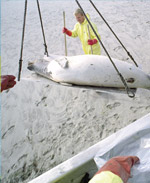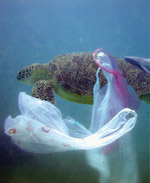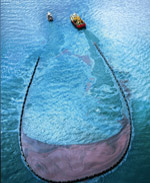- Last stop: The ocean – polluting the seas
- > Human society inevitably generates immense amounts of waste arising from the production and utilization of food as well as industrial and consumer goods. A considerable amount of this waste eventually ends up in the oceans. Fortunately, the pollution from oil has been decreasing in recent years. But the increasing load of nutrients and pollutants and general littering of the oceans are a growing cause for concern

Much to be done ...
Humankind is still discharging millions of tonnes of problematical substances into the sea. Some enter the marine environment during the production or use of specific products, while others can be classed as litter, or contaminate the sea with oil. However, the present situation differs from the past in one crucial respect. Whereas humankind, until only a few decades ago, deliberately disposed of waste in the sea, by far the major share of litter and pollutants now enters the sea indirectly along many different pathways. This is exactly what makes it so difficult to combat pollution – for in order to improve the situation, a whole package of measures is required. For example, in order to curb nutrient overfertilization of the seas, treatment plants need to be built onshore and the amount of fertilizer used in agriculture must be reduced. The success achieved in improving water quality in Western European rivers shows that the nutrient load can indeed be decreased in this way. Ultimately, every individual nation has a responsibility to adopt appropriate measures to keep its marine environment clean. Substances which are dispersed into the environment from the atmosphere, however, are far more difficult to control. This applies to nitrogens from the burning of oil, gas and coal, and to industrial chemicals such as polyfluorinated compounds or other persistent molecules. Here, the pollutants need to be captured at source. In some cases, however, the origin of the substances is not yet properly understood. Robust risk assessments offer a promising solution here: these evaluate the potential hazards associated with a given substance before it is brought to market. In contrast to substances such as polyfluorinated compounds, which are difficult to monitor because they are released not only during the production but also during the use of certain products, the solution to the littering of the oceans is obvious, and starts with correct disposal. In countries such as the Netherlands and Germany, recycling and bottle-deposit systems are well-established as a means of effectively managing the flow of disposable packaging. Many other countries, however, lack well-functioning waste recovery systems. However, waste management can only really work if the general public is sensitized to the problem of waste. There are now good examples of effective environmental awareness-raising all over the world. In contrast to the marine litter situation, a more positive trend can be observed with regard to oil pollution. The amount of oil in the sea has been decreasing for years. It is difficult to say whether this is due to more stringent controls on commercial shipping, monitoring overflights or better ship safety. It is also unclear, at present, which measures would be effective in significantly reducing oil pollution in future. One thing is certain: the threat posed by major tanker disasters is taken far more seriously today than just a few years ago. Disasters such as the Deepwater Horizon drilling rig explosion in the Gulf of Mexico nonetheless demonstrate that humankind is often helpless in the face of the problems caused by oil. It is still unclear whether the trend towards oil extraction at ever greater depths will increase oil pollution in the oceans. However, as the most recent example shows, there are currently very few strategies in place to combat oil pollution in the deep seas. Oil clean-up technologies for use when emergencies occur in deep-sea oil extraction and drilling therefore need to be developed as a matter of urgency. The oil industry has announced that it plans to set up a voluntary rapid response force; however, such measures must be monitored by impartial agencies.



